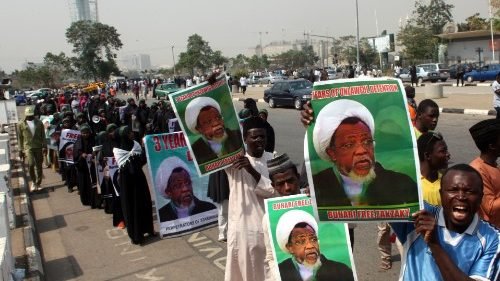In Nigeria, a ban on a Shiite Muslim group came after a court ruled the government could classify it as a “terrorist organization.” Cardinal Onaiyekan of Abuja decries the move saying it sets a dangerous precedent for all religious minorities.
By Linda Bordoni
This week marks 10 years since the start of the Boko Haram uprising in northeastern Nigeria where suicide bombings and mass kidnappings have led to the death of tens of thousands of people and the displacement of many others.
The somber anniversary coincides with the announcement of a government ban on the Islamic Movement of Nigeria (IMN), a Shiite Muslim group accused of running “terrorist activities, including attacking soldiers, killing policemen, destroying public property and consistently defying state authority.”
But speaking to Vatican Radio, Cardinal John Onaiyekan of Abuja says the government crackdown is not only unjust, it is a move that sets a worrying precedent for religious freedom in the country.
“Nobody is safe: today it’s the Shiites, tomorrow it could be us Catholics too,” he said.Listen to Cardinal John Onaiyekan of Abuja
Cardinal Onaiyekan explained that recently, for the government in Nigeria, the question of Shiite Muslims has become an issue.
He said IMN followers have been holding protests to demand the release of their leader, Ibrahim Zakzaky, who has been detained in prison for the last four years.
Various tribunals and courts, he noted, have ordered that he be released, and the government has refused to obey the courts’ order.
Thus, Cardinal Onaiyekan said, the established Sunni majority in Nigeria “doesn’t want to recognize that the Shiites are also Muslims, and because of this the government treats them with serious violence”.
Daily protests
He said the Shiites have been holding almost daily protests in the streets of Abuja for over a month.
“From my own understanding, the protests were always peaceful and we never saw them armed,” he said.
And yet, he noted, government soldiers and police have attacked them with arms, rubber bullets and tear-gas canisters.
News outlets said at least 20 members of the group were killed over the past week during the demonstrations.
Catholics are concerned
As for us Catholics, the Cardinal said, we are deeply concerned about this development: “if the government can influence a Court to declare a religious group proscribed, then nobody is safe – today it is the Shiites, tomorrow it might be us Catholics too.”
Noting there has not yet been an official response by the Catholic Church to the situation, he said he expects it is soon to come: “Personally my own position is that we cannot keep quiet and allow this kind of thing to keep going on”.
“If the Shiites break the law of the land they should be held accountable,” the Cardinal concluded, “but to simply proscribe them, it is going too far.”



